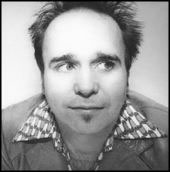Of all the precious moments that withstood the ravages of one too many keg parties, what’s your favorite memory from college? Is it the first time you woke up on a strange lawn, face damp with morning dew? Or perhaps that vigorous paddling you received from future fraternity brothers during the halcyon days of hazing?
One of the things I look back on most fondly from my years at Indiana University is Arson Garden. Few good bands passed through Bloomington, Ind., circa the late ’80s—a visit from They Might Be Giants or Bim Skala Bim was cause to rejoice—but our modest local scene boasted several standouts, Arson Garden chief among them. Fronted by siblings April and James Combs, the quintet recorded three albums, garnering favorable comparison to everyone from Throwing Muses to Television. They even made it to England to record a Peel Session before disbanding in the mid-’90s.
I hadn’t given Arson Garden much thought these past few years, but, last week, the drudgery of opening my mail was relieved by a very pleasant surprise. When I emptied the contents of a package from San Francisco label Ubiquity—the beat merchants responsible for the New Latinaires compilations, P’taah, and Greyboy All-Stars—out popped Please Come Down, a disc bearing the name and face of former AG guitarist James Combs.
I quickly hunted James down like an animal. I found him living in the City of Angels, working for Spinner hotshot Chris Douridas (formerly of KCRW’s “Morning Becomes Eclectic”), and discovering that he likes La-la-land. “L.A. is my favorite place I’ve ever lived,” he admits, with a hint of incredulity. “Every time I go to a party, I end up having five really interesting conversations. Everybody’s so gregarious here—because they’re in the entertainment business. For the first time since I was touring in Arson Garden, my life is completely about music.”
The 33-year-old Hoosier State native laughs when I reveal my initial reaction to getting his CD: Oh no, James made an acid jazz record! But that turned out to be far off the mark. Reborn as a singer-songwriter in the Elliott Smith/David Poe vein, with a smattering of ’60s West Coast pop thrown into the mix, Combs incorporates beats into some of his cuts, but he’s hardly pulling a Portishead number on his second solo album. “Ubiquity’s whole concept as a label is to be as diverse as possible,” he explains. “They started off doing primarily acid jazz, but they do Latin jazz, electronic stuff, hip-hop.” Combs was turned on to the label by Karry Walker, a Northern California troubadour who made a similarly groove-oriented disc for Ubiquity that was produced by Bay Area knob-twiddler Paul Scriver—who would play much the same role in shaping the atmospheric Please Come Down.
“I sent a demo to Andrew Jervis, vice president of Ubiquity, with this letter just saying ‘I like this [Karry Walker] record, the production is cool, I can hear my songs being done this way . . . what do you say?'” The balls-out approach paid off. “I sent him the letter on Tuesday, and he called me on Thursday and said, ‘We’re interested in doing something with you.’ It was very unlike any experience I’d ever had with a record label before.” And a far cry from the industry types who told Arson Garden they’d never succeed without leaving Indiana.
The bulk of Please Come Down was written between mid-1998 and mid-1999 when Combs was living in Northern California, working part-time at his brother-in-law’s Internet venture. “I had all this time, so I would noodle around on the guitar all day. I wrote probably three times as many songs as ended up on the album. I ended up with this really unmanageable pile of tapes. A lot of good songs I just lost, because they were on unmarked cassettes.”
No matter—the ones that made it to Please Come Down more than suffice. Rendered in a falsetto that threatens to dissipate in the ether one minute, then takes on a visceral edge the next, cuts like “Soft Star Mode” and “Strange Intervention” boast concise lyrics that aren’t much wordier than a couple haiku stitched together. “I always write about five times as much as ends up in the song, so the songs are these big, multipage affairs, with a lot of crap that gets trimmed out, till it’s just down to the stuff I really like,” says Combs.
“My whole approach to songwriting has been that intuitive-receptive approach,” he continues. “You pick up a guitar and start singing, and what comes out of your mouth becomes a song.” He even has a motto of sorts: “Create freely, edit ruthlessly.” Hopefully, this time the music born from that process will find an audience bigger than a clutch of Midwest scenesters.






